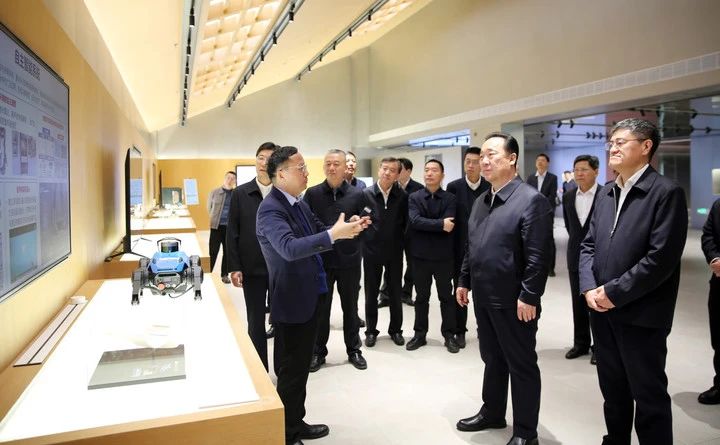
On March 21st, Zhejiang Governor Wang Hao conducted a focused investigation on the innovative landscape of artificial intelligence technology at Zhejiang University. He emphasized the pivotal role of innovation in driving forward the seamless integration of scientific and industrial innovation, hastening the advancement of new productive forces. He urged the establishment of a modern industrial system with distinctive Zhejiang characteristics, continually shaping new impetus and advantages for high-quality development, thus offering robust support for being pioneers of a new era.
Currently, Zhejiang University hosts three state key laboratories in artificial intelligence: brain-computer intelligence, computer-aided design and graphic systems, as well as blockchain and data security. Additionally, it houses national-level platforms such as the National Artificial Intelligence Industry-Education Integration Innovation Platform and the Provincial-Ministerial Collaborative Innovation Center for Artificial Intelligence. Wang Hao inspected laboratory research outcomes, received briefings on research directions and disciplinary developments, and gained comprehensive insights into the progress of artificial intelligence research and development. He highlighted that artificial intelligence serves as a crucial engine for cultivating new productive forces. He expressed his hope for Zhejiang University and the broader scientific community to set their sights on international frontiers, scaling technological peaks and seizing key breakthroughs in computing power, data, and algorithms. He emphasized the necessity of aligning with national development needs and industry demands to make substantial contributions to advancing high-level scientific self-reliance. He urged further utilization of national-level innovation platform resources, enhanced collaboration with sci-tech enterprises, deepened industry-academia research integration, accelerated the translation of innovative outcomes, and empowered the province's manufacturing industry towards high-end, intelligent, and environmentally friendly development through extensive and profound artificial intelligence technological innovation and digital transformation. Hangzhou and relevant provincial departments were called upon to fully support Zhejiang University's innovative growth and aid in tackling practical challenges.
Within this investigation, Wang Hao accentuated that amidst the rapid pace of the current wave of technological revolution and industrial transformation, seizing the bull by the horns of technological innovation would enable one to lead the charge and gain an edge in high-quality development. Encouraging a close alignment with Zhejiang's specific circumstances, with a strategic focus on big data, artificial intelligence, high-end software, and major technological breakthroughs, he emphasized the acceleration of nurturing new industries, models, and momentum. Wang advocated for promoting high-quality development in emerging industries through targeted measures and strategies, leveraging the province's early advantages in the digital economy, expanding application scenarios, bolstering institutional support, fostering deep integration between the digital and tangible economies, and providing a foundation for Zhejiang's distinctive modern industrial system. Wang Hao reiterated the imperative of fostering a conducive innovation ecosystem, facilitating synergy among top-tier universities, high-energy innovation platforms, and elite talents, and expediting the seamless circulation of educational and scientific talents to comprehensively enhance the capabilities essential for serving high-quality development.






